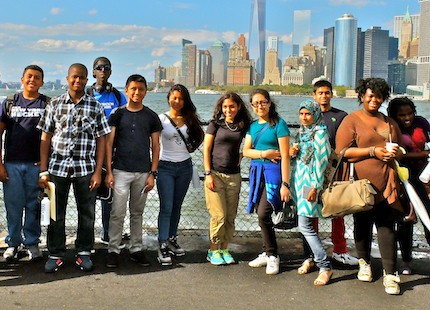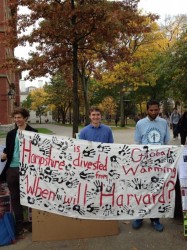What is Divestment? Why Should We Care? An ACE Alumnus Explains.
ACE Alumni
|December 12, 2012

This is a guest post from Chloe Maxmin, an ACE alumnus currently attending Harvard University.
This summer, I worked on the Tar Sands Free Northeast campaign, mobilizing to prevent Alberta’s tar sands from coming through an existing pipeline in Canada, Vermont, New Hampshire, and Maine—my home state. The plan would threaten drinking water quality, human health, marine economy, and tourism across New England. I drove through dense woods and followed yellow poles that marked an underground pipeline, surreptitiously winding around homes and under rivers. Most people didn’t know that toxic sludge could soon be running under their feet. What’s more: the pipeline is 76% owned by Exxon. I realized that the forces of the fossil fuel industry are deep and powerful. I needed to take action. I need to protect my home and fight these corporations.
I turned to a new movement focused on divesting university endowments, pension funds, and other investments from fossil fuel companies. I am joined by students at over 150 college campuses around the country. Campaigns are targeting the top 200 publicly-traded companies that own the majority of fossil fuels reserves in order to mitigate climate change and avert a climate crisis.
So what is divestment? It’s the opposite of investing. It’s selling the stocks that you own in a company. Divestment was used to stand against apartheid in South Africa, when thousands of people around the world sold their stocks in companies that supported the racist regime.
Why is this an important tactic? Here are two big reasons.
First, we must draw a moral line, declaring that we will not support an industry that is gambling with the fate of life on earth. Universities must uphold the values that they purport to promote throughout society. Higher education prepares students for the future. But how can we can we believe in our future if endowments are invested in companies that jeopardize our planet?
Second, divestment is reigniting the climate movement. Students are grabbing onto this tactic as a way to take back our future. We can’t fight through the political system because it is clogged by the fossil fuel lobby. Individual actions are important, but we need large-scale action as well. Now students are fed up. We demand action. Divestment is empowering students because each voice makes a difference.

I am a co-coordinator for Divest Harvard, and it has been amazing to see how quickly the campaign has taken off. We started the semester with a dozen students in a room trying to figure out how to bring divestment to the forefront of campus dialogue. We gathered over 1,000 signatures from students, staff, faculty, and alums. We held educational events, met with other students groups, and wrote many articles for our school newspaper. Then we were the first campus in the country to have a referendum question on our student government ballot about divestment.
I remember sitting in a room with fellow Harvard activists as we waited for the results of the referendum. I don’t know what I was expecting. We had a launched the campaign just a couple of months before, and I didn’t know if we had done a good job of getting out the vote and talking with students about the issue. But then, just after midnight on a Friday night, the results came in: 72% of voting students supported divestment. I was in shock. People were celebrating around me, but I just sat there. After sleepless nights, hours of petitioning, meetings, planning sessions, trainings, conversations, presentations, writing, reading, thinking…we had managed to make fossil fuel divestment one of the most important issues on campus. And we showed that students care about global warming and want our university to align our investment practices with our moral principles.
Climate change is no longer an abstract possibility. It is a concrete reality. Action is a necessity, and divestment is powerful platform for effecting change. In ten years, we will look back and realize that, at this moment, we changed the world.
For more information on fossil fuel divestment, visit www.gofossilfree.org! You can also learn about Divest Harvard at justandstable.org/divestharvard.
Join our Youth Action Network
More Blog Posts
Driving India towards self sufficiency and freedom from oil
India can shield itself from oil-price shocks and global pressure over Russian barrels by leaning harder into two strengths it …
Read More
Unnatural, Not Unprecedented
For two weeks, residents of Southern California endured a waking nightmare. Parents raced against time – hurrying down the driveway …
Read MoreCrafting a Vision for the Future: My Experience at LCOY USA 2024
Dry and sunny Tempe, Arizona where temperatures have been over 100 F for 113 consecutive days, delegates gathered to attend …
Read More